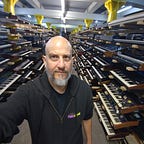10 Days. 10 Stories. Part 5–2014
Rugged edge computing meets managed services + new & unexpected opportunities. 2014 kicked off at a furious pace. We finalized the ns-box revision 2 just before moving into a newly renovated workspace. The game changer was fibre optic connectivity, extending our service network hosted in Paris with our local testbed & integration platform. It had become very frustrating deploying virtual machine images over an ADSL circuit! The new workspace was arranged with an electronics station, rackspace for hosting our dev machines & network gear (by the way, we deployed ns-boxes for our primary & secondary firewall routers).
Totally by chance we met up with a bunch of really cool people at Cowork in Grenoble which opened our eyes to a whole local ecosystem of startups and tech companies. We got connected with the local French Tech initiative, originally called Digital Grenoble now known as French Tech in the Alps and became a founding member. It was the moment to step outside the oil & gas box and explore new opportunities.
We also got invited to speak at SMI's Oil & Gas Telecommunications & M2M for Oil & Gas conferences in London. Which was a very cool experience.
On the oil & gas project front we were asked to build a custom ns-odu field ready enclosure kit with 110V AC power for a remote well site deployment in Casabe, Colombia!
Connectivity at the client's well site was via Inmarsat BGAN and the ns-box was configured to automatically acquire and process data from downhole fibre optic distributed temperature sensing instruments.
Next major project was for an independent oil company in Nigeria who had recently acquired brownfield assets in the Niger Delta. The brief required an end-to-end secure data logistics solution with managed services. So we extended our service network with VPN capabilities to provide a secure data path between the well site satellite connection (using Inmarsat BGAN) and the client's application hosted in Lagos, while keep system management and monitoring internal to fieldcloud. Thanks to our connectivity partners Arkessa & Galaxy1 we now operated a hybrid terrestrial cellular & mobile satellite closed user group network.
Before heading off to Lagos and Port Harcourt Nigeria we were invited to a pre-launch workshop for a brand new embedded electronic rapid prototyping platform called the AirBoard. Until now, we hadn't really done much with microcontrollers as our main focus had been on edge gateway computing with real operating systems. So this little device opened our eyes to new possibilities and set the scene for a whole new line of business.
The workshop/pre-launch event in June 2014 was very cool. We built a radio controlled helium balloon which was piloted via a bluetooth interface and were part of a video shoot for the AirBoard's crowdfunding campaign on Kickstarter (which was launched in early 2015, more on that in the next story!).
Introduced new governing principles: Make it minimal. Make it viable. Make it simple.
Back to Nigeria for another adventure. We spent about two weeks fitting out a recycled shipping container to house instrumentation & the edge computing system and fabricated a mast for the BGAN satellite terminal which was mounted already pointed to the correct azimuth and elevation for the client site.
Training field engineers how to rig up the satellite terminal and mast.
Kit nicely fitted inside the shipping container.
Team work is everything. Grateful to all the support and flawless on-site installation by Muyiwa Aboaba and his colleagues from Port Harcourt.
Sadly we weren't able to travel to the client's well site due to security restrictions. All the commissioning was done remotely from Port Harcourt in communication with the on-site field engineers. What was special about this project is that it was our first managed services deployment with remote system management provided by fieldcloud.
Following the Nigeria project we shipped ns-box kit to Canada for deployment at remote well sites in the tar sands used for monitoring steam injection, aka SAGD (Steam Assisted Gravity Drainage). This was also deployed as a managed service with M2M cellular connectivity from Arkessa. We also hosted the client software application in our secure service network in Paris.
What was unusual about this deployement is that the system was powered using a hybrid methanol fuel cell and solar panels. In the Canadian winter there isn't enough sunlight for solar PV and in summer the site is completely inaccessible as the tundra thaws into muddy swampland. After all our adventures the previous year in hot desert conditions it was good to also prove the ns-box worked in -40 degree ambient temperatures. We had a bit of help with the fuel cell which heated up the enclosure a bit.
Towards the end of 2014 we kicked off a very different project. Our client was building a subsea flexible riser surveillance system and needed to pass a cybersecurity audit. More on that in our next story!
10 Days. 10 Stories. A special feature celebrating fieldcloud’s adventure over the last decade and how we became the company we are today.
